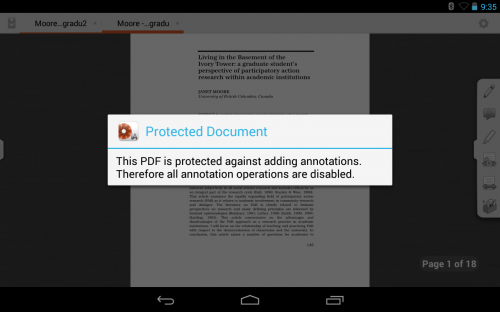
I’m in the midsts of one of those unavoidable grad student extended crises this month so I I thought writing something this week was going to be out of the question. But last Monday I had an interaction with a PDF that I really need to tell someone about. Trust me, its more interesting than it sounds.
Lately, I’ve been taking advantage of my institution’s (appropriately ancient-sounding) ILLiad Inter-Library Loan System. Usually, if I can’t find journal article I need, I just ask a fellow grad student friend over GChat or Facebook to get me the article from their library. If I can’t find anyone (or I’ve asked them too many times) I resort to ILLiad. Getting a book from ILLiad means waiting about 24 hours for an undergrad on work study to copy and paste a DOI and send me the article under another institution’s journal subscription. It is the ultimate exercise in artificial scarcity: A teenager in a library basement, fueled on Moe’s burritos and motivated by the threat of crushing student debt, orchestrates the transfer of a few ones and zeroes in such a way that my desire for the article can be monetized to the benefit of a publishing company’s CEO and a couple of computer system designers. The physical scarcity of a paper journal is transmuted into a new kind of scarcity: the scarcity of student labor and my own dedication to reading this article that I saw in someone else’s bibliography.
The article in question here is Janet Moore’s “Living in the Basement of the Ivory Tower: A Graduate Student’s Perspective of Participatory Action Research Within Academic Institutions” published in 2004 in Educational Action Research. The journal is owned by Taylor & Francis. The article focuses “on the ways in which universities are adapting to the presence of alternative research methodologies.” Moore is mainly interested in Participatory Action Research or PAR- a deeply collaborative research method wherein academics collaborate with community members on every aspect of the research design. Or, as Moore says:
“Academic research projects that involve participants in the research process (participatory) are committed to social change (action), and have elements of social learning (education) are often described and defined as participatory action research (PAR)” (P. 146).
I’m not about to get into the pros and cons of PAR. Suffice it to say both columns are mighty full and there are a lot of questions with difficult answers. Can someone with a PhD (or in the process of earning one) really have a noncoercive working relationship with a poor community? Who gets their name on the final product when your IRB says your participants anonymity needs to be “protected?” How can you call each other co-researchers when, after receiving grant funding, your university gets 42% off the top for “administrative costs” and that orphanage you partnered with has to justify (in writing) their food purchases? The organizational landscape just isn’t made for horizontal relationships. Even the ethics boards meant to protect people assumes (and reinforces) an extractive relationship where the researcher observes and collects data while participants do as they’re told. IRBs are good for avoiding another Stanford Prison Experiment but they won’t ensure scientific inquiry is carried out democratically.
In any case, my institution’s library does not subscribe to Educational Action Research and Nathan was getting a digital detox so I had to use ILLiad. I woke up Monday morning to an email notification saying that the library gnomes (work study students eating burritos) had retrieved my article. I download it, put it in my Zotero library and open it in iAnnotate PDF. Then I get this sad little error message:

The high levels of Morissetteian irony might have obscured the full picture, so let me restate it, in full, right here: My article about radical democratic knowledge-making had been DRM’ed by a university’s library. I don’t know why this one article was protected (none of the others had been) but it seems like a pretty safe assumption that it had something to do with concerns over “intellectual” property.
I put scare quotes around “intellectual” because what we’re really dealing with here is plain old property. Just because IP looks particularly preposterous to the predominantly white, male libertarian digerati doesn’t mean intellectual property make any less sense than other ownership regimes. When Pierre-Joseph Proudhon wrote “property is theft!” he wasn’t just coining a slogan, he was making an intellectual argument. In the same way that a person enslaves another by choosing not to kill them when they have the right and ability to do so, an object becomes property –according to Proudon– when someone has the right and ability to destroy that object but doesn’t. Proudon saw property regimes as nothing more than extended, institutionalized, and socially legitimated hostage situations. Thinking about the ownership of digital goods through this lens is confusing. The Internet makes destroying, and thus owning, digital artifacts very difficult. When you jailbreak your iPhone you’re not stealing anything, but you are breaking Apple’s ability to regulate (which includes destroying) the apps that you install. When Apple blocks (for example) Josh Begley’s app that alerts users when a drone strike occurs they are exercising their intellectual property rights. The right to destroy information. Owning information isn’t just about storing it, it can also be about destroying it.
When it comes to radically democratic research methods in the services of social justice, there’s an important and often overlooked issue of data publicity, not just data privacy. Working with disadvantaged groups doesn’t mean just protecting their identity or sensitive information, it also means making sure the data that they produce has a certain resiliency to it. Its incumbent on the researcher to assure that access to the products of collaborative research does not fall along the same institutional, socioeconomic, and cultural fault lines that marginalized participants in the first place. Not a single one of the articles I’ve read on PAR (and that includes articles published this year) say anything about open access publishing. There’s a lot about making documents and ensuring that authorial credit is given when it is due, but the choice of academic publishing venue for the researcher is just not mentioned.
I’m not claiming to have read every single article about PAR, but I think I should have come across something about open access by now. If you run in circles that frequently cite Paulo Freire’s Pedagogy of the Oppressed and have articles explicitly about OA, please let me know. It certainly should be a prerequisite for collaborative and participatory research. And, just in case you find yourself in a similar PDF predicament, you should certainly check out PDFUnlock– a service that I have definitely never used.
David is on Twitter and Tumblr in between writing paragraphs of his dissertation proposal.
Correction: This article accidently abbreviated Intellectual Property to IR. Comments that refer and quote IR are referring to IP.

Comments 8
Kristian Lund — September 11, 2013
"Just because IR looks particularly preposterous to the predominantly white, male libertarian digerati doesn’t mean intellectual property make any less sense than other ownership regimes."
I would not argue that IR makes less sense because I am white, because I am digitally literate or male. Nor because it "looks that way to me". I, and others, have in fact argued (not just opined from the ivory tower and throne of the hegemony) exactly why IR makes no sense. Or at least far, far less sense than ownership models for scarce, physical goods. It seems a tad unfair to dismiss such arguments as mere opinions held because of class, education or gender...
I have, for instance, argued that IR makes less sense because the usual justifications for ownership (without it, noone could legitimately eat so much as a berry, nor would anyone be motivated to improve anything) are rendered completely useless when scarcity is no longer a factor. In short; you do not need to "own" a software program in order to benefit from writing it.
http://archive.org/details/OwnershipOfKnowledgeIsThereANaturalRightTointellectualProperty
Sebastian Benthall — September 11, 2013
Yep, this is true
Judy — September 11, 2013
Great article. PS do you prefer iAnnotate to Moon Reader or EZ-PDF Reader? Random question I know, but I'm curious.
Hillary — September 16, 2013
As someone who, as a college student 20 years ago, worked in the basement of the library, making actual photocopies of articles and putting them in envelopes to send to other libraries, I have to laugh at your characterization of ILLiad as "ancient." In this case, and in others as you mention, you weren't able to get a friend at another school to send it to you - what if ILLiad didn't exist? To get a PDF of an article from a great distance in 24 hours or less is an enormous privilege (that you pay for with your tuition dollars) - don't knock it! And at least a student is getting paid to slake your intellectual thirst...
Dead Drops » Cyborgology — September 24, 2013
[...] iconically argued that “Information Wants to Be Free.” Here at Cyborgology, David Banks has written extensively on the constructed scarcity of ideas and information. The Dead Drop project takes a [...]
Elsevier:Removing Papers from Academia.edu Since 2013 » Cyborgology — December 11, 2013
[…] posting our work on these sites is illegal. However, the publishers’ policies, which create false scarcity, exploit intellectual labor, and restrict knowledge sharing, are in a word, preposterous. Here’s […]
(Intellectual) Property is Theft! | David A Banks — March 6, 2014
[…] Lately, I’ve been taking advantage of my institution’s (appropriately ancient-sounding) ILLiad Inter-Library Loan System. Usually, if I can’t find journal article I need, I just ask a fellow grad student friend over GChat or Facebook to get me the article from their library. If I can’t find anyone (or I’ve asked them too many times) I resort to ILLiad. Getting a book from ILLiad means waiting about 24 hours for an undergrad on work study to copy and paste a DOI and send me the article under another institution’s journal subscription. It is the ultimate exercise in artificial scarcity: A teenager in a library basement, fueled on Moe’s burritos and motivated by the threat of crushing student debt, orchestrates the transfer of a few ones and zeroes in such a way that my desire for the article can be monetized to the benefit of a publishing company’s CEO and a couple of computer system designers. The physical scarcity of a paper journal is transmuted into a new kind of scarcity: the scarcity of student labor and my own dedication to reading this article that I saw in someone else’s bibliography. (more…) […]